In its bi-annual report to the African Commission on Human and Peoples’ Rights (ACHPR), DefendDefenders (the East and Horn of Africa Human Rights Defenders Project) provides a six-month overview of events affecting the rights to freedom of association, expression, and peaceful assembly in the East and Horn of Africa sub-region.
DefendDefenders welcomes the opportunity offered by the 65th Ordinary Session of the ACHPR to highlight some of the human rights issues in the East and Horn of Africa sub-region for the period of April to October 2019. This submission was prepared with the assistance of reports and information sent to DefendDefenders, the secretariat of the East and Horn of Africa Human Rights Defenders Network (EHAHRD-Net), by our members and partners throughout the sub-region, and submitted on 23 October 2019.

Executive Summary
Over the past six months governments in the sub-region have sought to restrict legitimate expressions of civilian dissent like peaceful demonstrations, the free expression of human rights defenders (HRDs) and media, as well as targeted civil society organisations (CSOs) through various strategies of harassment and repression.
Less than a year ahead of Burundi’s contentious 2020 election, the UN Commission of Inquiry highlighted a climate of fear and intimidation in the country, with state agents and Imbonerakure militias committing serious human rights violations against civilians, along with several limitations on freedom of expression and association.
Djibouti and Eritrea continue to be ruled by two of the most repressive governments in the sub-region, with little to no independent HRDs operating freely in the country. Despite a welcome thawing of diplomatic relations in the Horn of Africa, civil society activists, journalists and other HRDs continue to suffer attacks from state security forces, leading to arrests, arbitrary detentions and torture.
Despite progressive human rights developments in Ethiopia, the country faces increased uncertainty with rising ethnic tensions, security breakdowns and a highly publicised regional coup attempt only a year after a new Prime Minister promised radical reforms in a country beset by years of demonstrations and frustrations.
Tanzania continued to aggressively crack down on civic spaces and target the country’s opposition politicians and few remaining independent media outlets, especially those critical of the state as preparations begin for elections in 2020. Restrictions on opposition politicians have also increased in Uganda, with critics increasingly stifled as the government concurrently grapples with allegations of torture against suspects of high profile extra-judicial killings.
South Sudan’s government and rebel leaders agreed to form a new transitional government as per a peace agreement signed in December 2018, but observers remain only cautiously optimistic amid sporadic violations of the ceasefire and continued human rights abuses throughout the country with little chance of real accountability through a mandated Hybrid Court which has failed to materialise.
Extrajudicial killings by police and the forced eviction of indigenous communities remain common and critically unaddressed in Kenya, while a High Court decision to retain colonial-era legislation criminalising same-sex relations in May was a major blow to human rights activists.
While considerable progress in establishing conditions for the enjoyment of human rights has been made in Somalia/Somaliland, major challenges remain including terror attacks, insecurity, human rights violations, poverty, and inter-clan conflicts which prevent the proper flourishing of human rights organisations.
Despite the government touting of its Universal Period Review record, the space for dissent in Rwanda remains critically low, with continued accusations of harassment and murder of political opponents levelled against the state, both at home and abroad.
After months of protests led to the ouster of Sudan’s longtime dictator, the military and a civilian council agreed on a transition period with the ultimate aim of full civilian rule. However, serious questions remain regarding accountability for crimes committed during the previous regime and the massacre of more than 100 civilians during the demonstrations.
Recommendations
In light of the updates and trends observed in this report, DefendDefenders makes the following recommendations for action by the African Commission on Human and Peoples’ Rights:
- Call on member states to adhere to their commitments to protect, respect and fulfil the fundamental human rights and freedoms guaranteed by the African Charter on Human and Peoples Rights;
- Call on member states to adopt specific legislative measures to recognise the status of HRDs, accord them the necessary protection, and provide a conducive working environment as per resolution 376 (LX) 2017 adopted during the 60th ordinary session in Niamey, Niger;
- Call on member states to cease the harassment of HRDs including those working on sexual orientation and gender identity issues, and recognise that the rights in the African Charter on Human and Peoples’ Rights are universal;
- Call on member states to cease the harassment of HRDs including those working on sexual orientation and gender identity issues, and recognise that the rights in the African Charter on Human and Peoples’ Rights are universal;
- Undertake a fact-finding mission to Tanzania to investigate and document human rights violations;
- Support the Government of South Sudan to immediately establish and operationalise the Hybrid Court for South Sudan, the commission for truth, reconciliation, and healing, and the compensation and reparation authority; to ensure transparent accountability for crimes committed during the conflict;
- Call on States to abide by the Guidelines on Freedom of Association and Assembly adopted by the Commission during its 60th Ordinary Session, ensuring that they fulfil their obligations under the African Charter by fully protecting these rights;
- Encourage member States who have not done so to deposit the declaration under article 34(6) of the protocol of the African Court on Human and Peoples’ Rights to allow individuals and NGOs to directly submit their cases to the court; and
- Urge the Government of Sudan to ensure that the National Investigative Committee conducts its work in an open, transparent and impartial manner with a view of ensuring justice and accountability for victims of the 3 June massacre, and commit to support the Committee in the course of its work.

